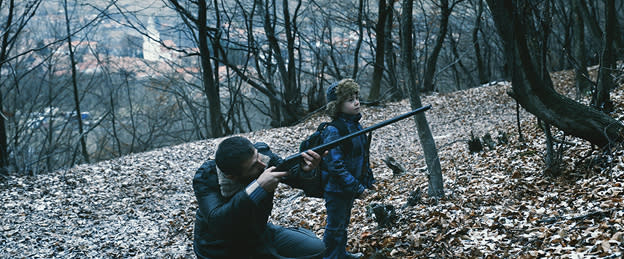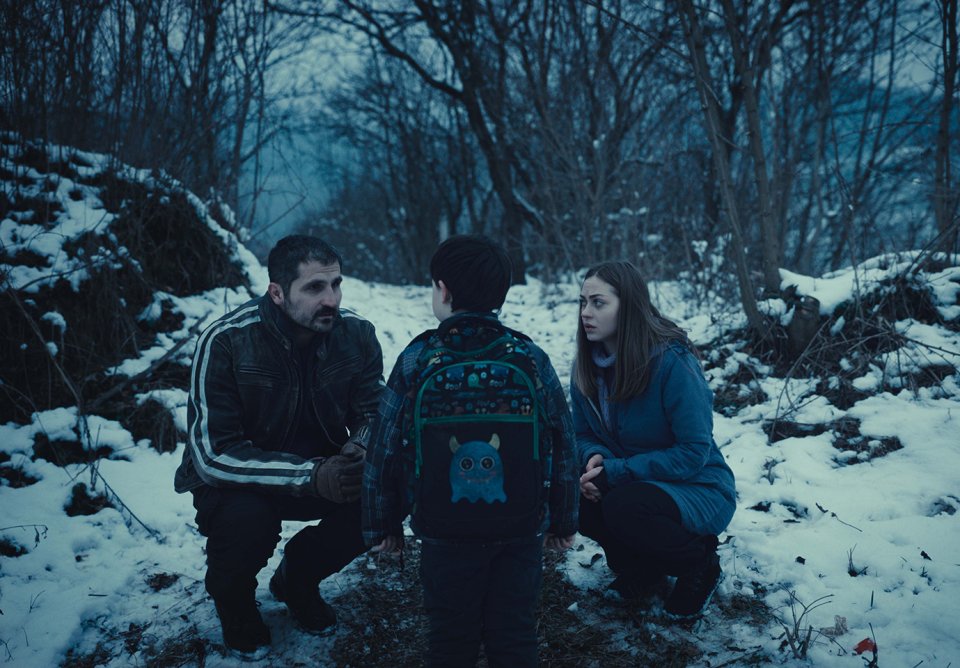Cristian Mungiu: ‘I Pass as Being Radical in the States, but Here I’m Very Mainstream’

- Oops!Something went wrong.Please try again later.
A new Cristian Mungiu film is always cause for celebration. “R.M.N.,” his first film since 2016’s “Graduation” won Best Director at Cannes, once again immerses us in the casual brutalities of Eastern Europe.
Here, the Romanian “4 Months, 3 Weeks and 2 Days” filmmaker turns his camera back on Transylvania, here an ethnic melting pot of a Transylvanian village to which Matthias (Marin Grigore) returns from Germany looking for work and to possibly reconnect with his ex, Csilla (Judith State). Csilla, meanwhile, is met by town-wide derision after hiring three Sri Lankan men to work at the bread factory she’s second-in-command of, setting off a tripwire of prejudices throughout the village.
More from IndieWire
The Oscar Process That Needs an Overhaul: International Filmmakers Speak Out
'R.M.N.' Trailer: Cristian Mungiu's Crucible Is Among the Year's Most Harrowing and Brilliant Films
“Xenophobia is everywhere, but this was interesting because it was in a community of people living as a small minority in the middle of a majority, having a different language, traditions, culture and religions, and normally you would imagine that they should be more empathetic with other people, which would constitute even a smaller minority, but on the contrary, they weren’t,” Mungiu told IndieWire.
Indeed, the town is comprised of various immigrants, including the Hungarian Csilla, who spends her nights downing wine and teaching herself the string theme from Wong Kar Wai’s “In the Mood for Love” on cello. Mungiu based the film on an incident of xenophobia that occurred in the Romanian village of Ditrău, where the Hungarian population’s ethnic identity felt threatened by the introduction of foreigners to their workforce. The January 2020 incident led to a petition signed by nearly 2,000 people that pushed the Sri Lankans out of the village.
“It’s not about Sri Lankans. It’s about the Roma population… I noticed that so many of the Romanians, Hungarians, easterners live and work abroad in western countries and they hate to be treated the way we treated these people when they came,” he said. “I was wondering, ‘Why do people behave like this?'”
Mungiu said he wrote the movie three years ago based on internet research before going to Ditrău, where “I found the context of this lady owning the bakery… She was kind enough to talk to us. She was very open, and after she explained her point of view of what happened, she allowed us to talk to the workers… I started investigating in the community people having a part in the decision, and I talked a bit with a priest, and then I met the mayor, only to find out the things that I had imagined were quite close to the reality.”

IFC Films
As “Graduation” was also set in Transylvania, Mungiu said that he wanted the two films to demystify the connotations of what Transylvania, Romania’s most western province, really is. “What is Transylvania? Where’s Dracula? They haven’t seen Dracula over there. And where is Romania, and where at the gypsies? Why are we so displeased we are called gypsies. Aren’t Roma and Romanians the same people?” (He’s referring to the Indo-Aryan population spread diasporically throughout Europe.)
According to the director, “R.M.N.” is an acronym for nuclear magnetic resonance, a phenomenon involving a push-pull between a strong magnetic field and a weak one. “It’s a reflex of this survival instinct. We shape our brains for years to recognize everybody else who does not belong to our tribe as being an enemy and not a friend,” he said. “Instead of seeing the things we have in common, we often see the things that are different. That was pretty much enough at a starting point.”
The film culminates in a 17-minute unbroken take during a fractious town meeting that includes at least 26 different speaking parts overlapping each other — and it’s based on the actual Ditrău town hall that resulted in the dismissal of the Sri Lankan workers from the village.
It’s an astonishing feat of filmmaking and also a deliberate one: “The choice is coming from my style that I impose to myself via the shooting. I know before I started shooting that every other moment is going to be recorded in real-time without any cuts,” Mungiu said. “I can have it shorter or longer, but I don’t do any kind of coverage. So I knew from the beginning that that scene needed to be recorded in one shot. It’s not that complicated to imagine this kind of assembly.”

Courtesy of Mobra Films. An IFC Films Release.
Mungiu, who worked closely with a translator on the screenplay to convey the various dialects and languages merging in the scene, said, “It’s such a Babel tower that they understand each other better even if they speak different languages than they agree when they speak the same language.” It took Mungiu around 25 takes across two weeks to finally get the scene right.
“R.M.N.” ends on a strangely elliptical image involving the actual bear population of the village and a far-right faction of protesters who dress up in bear costumes as a form of protest against the outsiders. It’s not hard to make the connection between this and what was worn at the January 6 riots. Whether or not that’s deliberate, Mungiu is certainly open to the idea that his movie isn’t just about Eastern Europe but, in fact, everywhere.
Mungiu said that after the film premiered at Cannes last year, “This American guy from the industry said, ‘Wow, they’re going to like it in the States. Nobody will understand the ending. But you need to tell them, if you don’t understand the ending, don’t bother. It’s not important.’ But for me, it is important. I am part of these directors who really know what they want. It’s not that I want something very precise, but I have to admit that the final meaning of all these bears at the end… was meant to be interpretable somehow, but I am disturbed that some other part was supposed to be clearer, and that’s my fault, because it’s not.” What that ending is we’ll leave for you to discover and decide.
Mungiu is used to polarizing reactions to his movies, though. “I don’t know about this clash in cinema between mainstream and films which belong to the industry and some sort of very radical, critical spirit believing that the truth lies in the most radical national kind of cinema. I respect this. Cinema is really reinvented by people who are radical and not by people who are mainstream. I pass as being very radical in the States, but here [in Romania], I pass as being very mainstream.”
“R.M.N.” is now in limited release from IFC Films.
Best of IndieWire
Sign up for Indiewire's Newsletter. For the latest news, follow us on Facebook, Twitter, and Instagram.

